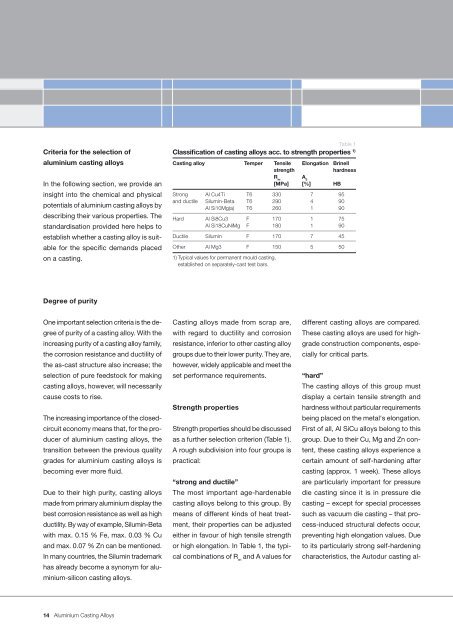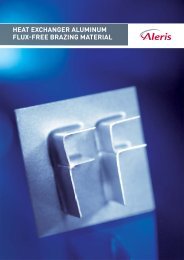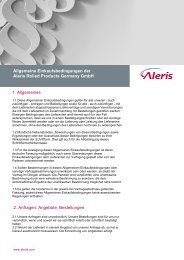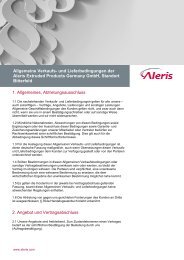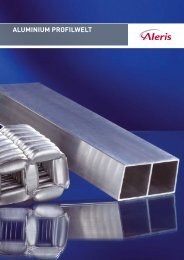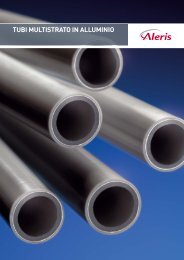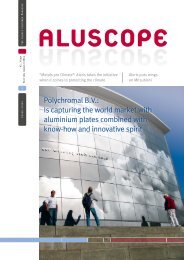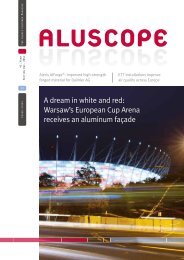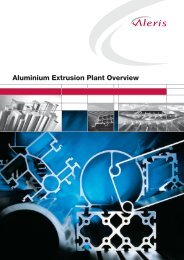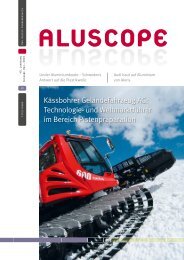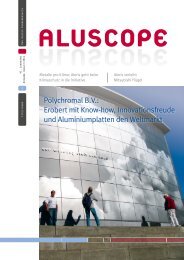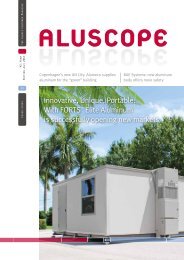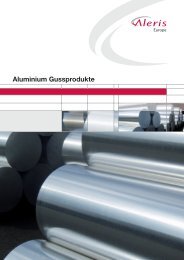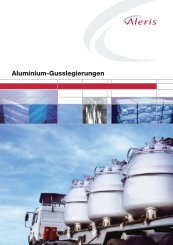You also want an ePaper? Increase the reach of your titles
YUMPU automatically turns print PDFs into web optimized ePapers that Google loves.
Criteria for the selection of<br />
aluminium casting alloys<br />
In the following section, we provide an<br />
insight into the chemical and physical<br />
potentials of aluminium casting alloys by<br />
describing their various properties. The<br />
standardisation provided here helps to<br />
establish whether a casting alloy is suitable<br />
for the specifi c demands placed<br />
on a casting.<br />
Degree of purity<br />
One important selection criteria is the de-<br />
gree of purity of a casting alloy. With the<br />
increasing purity of a casting alloy family,<br />
the corrosion resistance and ductility of<br />
the as-cast structure also increase; the<br />
selection of pure feedstock for making<br />
casting alloys, however, will necessarily<br />
cause costs to rise.<br />
The increasing importance of the closedcircuit<br />
economy means that, for the producer<br />
of aluminium casting alloys, the<br />
transition between the previous quality<br />
grades for aluminium casting alloys is<br />
becoming ever more fl uid.<br />
Due to their high purity, casting alloys<br />
made from primary aluminium display the<br />
best corrosion resistance as well as high<br />
ductility. By way of example, Silumin-Beta<br />
with max. 0.15 % Fe, max. 0.03 % Cu<br />
and max. 0.07 % Zn can be mentioned.<br />
In many countries, the Silumin trademark<br />
has already become a synonym for aluminium-silicon<br />
casting alloys.<br />
14<br />
<strong>Aluminium</strong> <strong>Casting</strong> <strong>Alloys</strong><br />
Classifi cation of casting alloys acc. to strength properties 1)<br />
Table 1<br />
<strong>Casting</strong> alloy Temper Tensile Elongation Brinell<br />
strength hardness<br />
Rm [MPa]<br />
A5 [%] HB<br />
Strong Al Cu4Ti T6 330 7 95<br />
and ductile Silumin-Beta T6 290 4 90<br />
Al Si10Mg(a) T6 260 1 90<br />
Hard Al Si8Cu3 F 170 1 75<br />
Al Si18CuNiMg F 180 1 90<br />
Ductile Silumin F 170 7 45<br />
Other Al Mg3 F 150 5 50<br />
1) Typical values for permanent mould casting,<br />
established on separately-cast test bars.<br />
<strong>Casting</strong> alloys made from scrap are,<br />
with regard to ductility and corrosion<br />
resistance, inferior to other casting alloy<br />
groups due to their lower purity. They are,<br />
however, widely applicable and meet the<br />
set performance requirements.<br />
Strength properties<br />
Strength properties should be discussed<br />
as a further selection criterion (Table 1).<br />
A rough subdivision into four groups is<br />
practical:<br />
“strong and ductile”<br />
The most important age-hardenable<br />
casting alloys belong to this group. By<br />
means of different kinds of heat treatment,<br />
their properties can be adjusted<br />
either in favour of high tensile strength<br />
or high elongation. In Table 1, the typical<br />
combinations of R and A values for<br />
m<br />
different casting alloys are compared.<br />
These casting alloys are used for highgrade<br />
construction components, especially<br />
for critical parts.<br />
“hard”<br />
The casting alloys of this group must<br />
display a certain tensile strength and<br />
hardness without particular requirements<br />
being placed on the metal‘s elongation.<br />
First of all, Al SiCu alloys belong to this<br />
group. Due to their Cu, Mg and Zn content,<br />
these casting alloys experience a<br />
certain amount of self-hardening after<br />
casting (approx. 1 week). These alloys<br />
are particularly important for pressure<br />
die casting since it is in pressure die<br />
casting – except for special processes<br />
such as vacuum die casting – that process-induced<br />
structural defects occur,<br />
preventing high elongation values. Due<br />
to its particularly strong self-hardening<br />
characteristics, the Autodur casting al-


